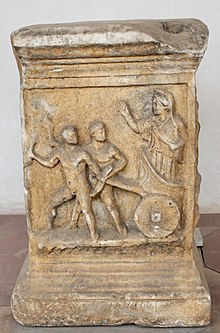Greek pessimism
As Greek pessimism is defined as a certain denial of life, the Greek thought since the archaic coined.
Humans are at the mercy of fate and the almighty gods , and material happiness is short-lived. The only way out is the Sophrosyne ethic, recorded in the Delphic maxims of the famous Seven Wise Men at the Temple of Apollo in Delphi :
| Wise | Greek | German |
|---|---|---|
| Thales of Miletus | Γνῶθι σεαυτόν. | Recognize yourself! |
| Solon of Athens | Μηδὲν ἄγαν. | Nothing too much! |
| Chilon of Sparta | Ἐγγύα, πάρα δ 'ἄτα. | Guarantee, - there is already disaster. |
| Pittacus from Mytilene | Γίγνωσκε καιρόν. | Know the right moment! |
| Bias from Priene | Οἱ πλεῖστοι κακοί. | Most of them are bad. |
| Cleobulus of Lindos | Μέτρον ἄριστον. | Measure is the best. |
| Periander of Corinth | Μελέτη τὸ πᾶν | Have the whole thing in mind. |
This pessimistic thinking can also be found, for example, in Socrates , who sees nothing bad in death: after that, when man has led a life in wisdom, the soul comes to the pure land of ideas, where only unclouded knowledge awaits it.
Based on the history of research, this interpretation is comparatively young, because Johann Joachim Winckelmann , a contemporary of Goethe, attested the Greeks a "noble simplicity and quiet greatness", which suggests a contrary position. Only the philology of the 19th century did away with this optimism. The German philologist Nietzsche lifted this position of the classical and answered it with a romantic one, by reinterpreting the Greek mentality. But he also leaves room here, as he grants the mystery cults a special position that relativizes a depression. This can be clearly seen in Apollon and Dionysus, the pair of opposites that symbolizes pessimism and optimism.
Examples
Another classic example is the happiness definition of Solon , shown by Herodotus , who incidentally was also one of the Seven Wise Men. After that, only the one who ends his life well is truly happy, everything beforehand does not count, because it is at the mercy of the interplay of fate.
Solon describes the Athenian citizen Tellos as the happiest person because he “had many good and beautiful children when the city was doing well, and he saw all of them bear children and all survived, he was doing well by our standards and he had an excellent end was granted ". Tellos was killed in battle for his hometown Athens.
In second place are the brothers Kleobis and Biton , two strong, young men who, instead of the oxen that were in the field, pulled the wagon of their mother, a priestess, to the temple of Argos. Then the mother asked the deity as a reward for the trouble of her sons the best that could happen to a person: Cleobis and Biton died that same night.
See also
- Ζωῆς πονηρᾶς θάνατος αἱρετώτερος. (" Death is preferable to a bad life. ")
- Κάτθανε, Διαγόρα, οὐ καὶ ἐς Ὂλυμπον ἀναβήσῃ. (" Die, Diagoras, for you cannot also go up to Olympus. ")
- Θνατοῖσι μὴ φῦναι φέριστον. (" For mortals, not being born is best. ")
